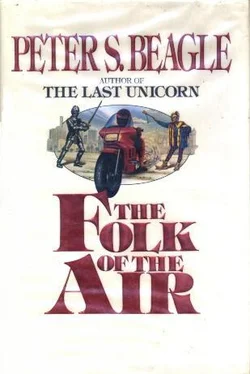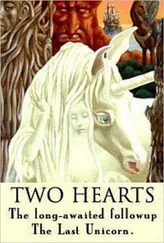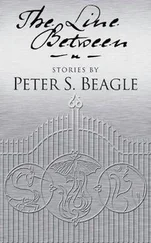“Sonofabitch,” Farrell said softly. “I didn’t know they built any up this far.” There were banners floating over battlements and gargoyles smirking from the stone-framed entryway. He said, “The Avicenna castles. I’ve never been in one.”
“A bunch of crazies built them in the twenties,” the Druid said over his shoulder. “Aleister Crowley freaks, or Theda Bara, somebody like that. Used to steal each other’s daughters. I read about it.” Farrell helped Julie down from the bus, and she handed him his lute, saying, “Joe, it’s a wedding. Just have fun, that’s what it’s for. That’s all it’s for.” She took firm hold of his arm, leading him toward the yellow castle.
Storisende’s four stucco towers were set around a central courtyard, busy and close with trumpet vines, climbing rosemary, overhanging plane and fig trees, a miniature boxwood maze, mossy flagstones, and a fishpond the color of onion soup. The two towers at the back of the courtyard were themselves spired corners of a rambling, tile-roofed house that had apparently changed its mind and decided to be a Spanish mission instead of a Norman keep. The odors of jasmine, wild lilac, and oleander quarreled in Farrell’s nostrils, making him sneeze pleasantly. He broke off a sprig of jasmine, placed it in the cross-laced front of Julie’s blue velour gown, and kissed her when she looked up in surprise. “There, see,” he said. “I’m having fun already.”
The marriage feast was going on in both rear towers, spilling back and forth through the main house in a tidal wash of laughter as flamboyant as a magician’s scarves, fiercely bawdy wedding catches, and the turned-earth smell of the League’s tongue-numbing homebrew. For all its blithely jumbled facade, the castle’s designer had done well with columns of sand and lime and air; the stone stairways were all external and the artfully bulging tower walls were thinner than they looked, leaving unexpected space for three stories’ worth of wide landings, and round or octagonal rooms as high as lofts, all of them aswirl with men and women whose clothes cast the shadows of great, brawling birds. Farrell drew the lute quickly against him, not simply to shield it from collisions, but to still the voices that rioted in the sentient wood and made it whimper angrily in his arms.
He lost Julie almost immediately to a pair of young girls dressed in the gold-heavy robes of Scythian nomads, who swarmed up to her crying, “Lady Murasaki, the Nine Dukes, all are here, all, hast ever seen such a wedding?” and dragged her off to join in a women’s chorus engaged in singing their own songs of carnal counsel to the bride. Farrell roamed the rush-strewn floors at fascinated random, constantly striving to down one full mug of ale before someone’s robe or sword hilt knocked it out of his hands. One room was largely given over to a buffet table burdened with platters of conger in souse, beef marrow fritters, meat tiles, friants, numble pie and florentine; in another, an intense argument concerning Senate candidates, couched entirely in the imaginary language of the League—“God’s teeth, sirrah, beshrew me, but I’ll put it to thee plain, thy man’s naught but a mewling, doddering old puppet of the military-industrial complex”—had half a dozen weapons clear of their sheaths by the time the noble Duke Frederik the Falconer could intervene.
A third room did its best to contain the admirers of the Countess Elizabeth Bathory, as she held her own court, clad in nothing much but her two languorous pythons, Vlad and Bela. Lovita Bird, herself dressed entirely in interlaced bands of tooled white leather, was standing to one side, looking contemptuously amused. Farrell eased up to her and murmured, “Come on, Vlad’s kind of a dip, but Bela’s all right. Or maybe that’s Vlad.”
Lovita curled exactly half of an exquisite upper lip. “Both of them a sight better-looking than the best day she ever saw. Woman’s got no more shame than she got shape.” She snorted delicately, which Farrell had never seen done.
“Hamid says those snakes are League members. Hamid jives me a lot.”
“It’s the truth. Associate members, sibyls to the king or some such. Poor old Bohemond, he’s got to bring them those lab rats, offerings, and he’s supposed to ask their advice on things. Says so right there in the bylaws.”
Garth de Montfaucon strolled past with his arm around the bride and a side-glance like a paper cut. Farrell said to Lovita Bird, “You look great in that outfit. Did you make it yourself?”
“I look great in a whole lot of outfits,” she said comfortably. “But thank you. Yeah, I made this one, I make most of the stuff I wear here. Keeps me in mind that I’m Amanishakhete Queen of Nubia and no damn bus driver. Can’t afford to be forgetting that.”
Farrell stared, considering her slender brown arms and small hands. “That’s what you do? You drive a school bus?”
“In a pig’s coochie, honey.” Lovita Bird patted his hand. “Metro Transit, eight hours a day hauling one of those big, whonking, articulated mothers across two county lines and the damn Bay Bridge. Throw them off when they’re drunk, they stick me up when they’re stoned, call me names when they’re straight. You think I could stand that shit if I thought it was real life?”
Aiffe’s laughter prickled around the edges of everything, rubbing raw places in the joyous evening. Farrell had glimpsed her two or three times, usually slipping between couples like a memory, teasing either the man or the woman away with her, to dance or to whisper. He had not seen Nicholas Bonner anywhere.
He moved on quickly to sit in a corner with several children, who were playing a strange game, juggling walnuts from hand to hand. All were in full costume, kirtled and tabarded miniatures of their elders, and even the very youngest among them spoke the League talk as fluently as the adults, and more naturally. Farrell learned that they belonged to the three families who made up the household of Storisende; two of them had been born in the stucco castle. As was usual, the girls served Queen Leonora as maids of honor, while the boys went as pages or squires, depending on their ages. All their references centered on League realities, whether they were describing a tournament at “the fair realm of Broceliande in the North”—Farrell thought they might mean Seattle—or merely fussing at one another over the sharing of sticky spun-sugar dulces. Yet when Farrell asked them where they went to school, they fell effortlessly into standard California English, chattering about grades and recess enemies as eagerly as they had just debated the order of precedence at a royal banquet. Farrell found this dizzying, like hitting an air pocket.
At the buffet, while discovering that the thick meat custard called mortrews had enough of a slow-acting, spicy kick to set fire to his teeth, he was accosted by a large, smiling woman, sweetish and powdery as a marshmallow. She wore a full-sleeved, fur-embroidered black robe that touched the floor, a huge, teetering headdress of gauze and wire, and a golden belt with a ring of a good dozen keys that clattered like knives whenever she moved. “Sir Musician, you should be with your fellows,” she scolded him gaily. “Musickers are all for playing while their lords dine, to sweeten their digestion with their gladsome airs; it were scandalous anarchy otherwise.” She slapped his arm lightly and handed him a turnover in the shape of a crowned swan.
“Lady, my comrades are also at their meat,” he answered, pointing out the Basilisk crew with their wooden trenchers as laden as his. Across the room, John Erne’s Nisei pupil, the Ronin Benkei, nodded soberly to him, and Lovita Bird waved a jellied eel. The smiling woman said, “Now you are the Lady Murasaki’s man, the Knight of Ghosts and Shadows. I am called Janet of Carterhaugh, chatelaine of Storisende.”
Читать дальше












